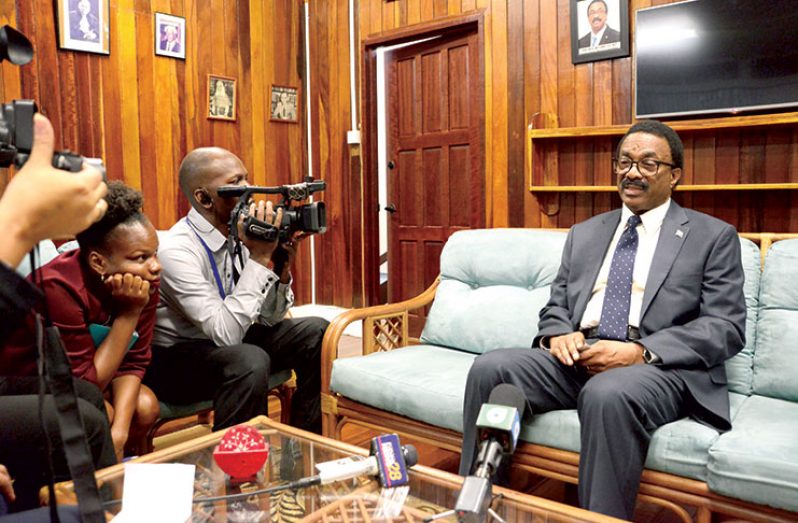…AG promises stepped-up efforts to tackle scourge
GOVERNMENT will be intensifying its efforts to investigate and prosecute money launderers, Attorney General, Basil Williams has said.
He said there needs to be improvements in this regard as it will enable the country to succeed in the Fourth Round of Mutual Evaluations of the Caribbean Financial Action Task Force (CFATF)/Financial Action Task Force (FATF) in relation to Anti-Money Laundering and Countering the Financing of Terrorism (CFT).
On Monday, Williams told reporters that there is need for improvement in agencies such as the State Assets Recovery Agency (SARA); the Special Organised Crime Unit (SOCU) and the Financial Intelligence Unit (FIU).
He noted that the government is prepared to assist in ways it can to ensure that when the time of evaluation arrives in 2022, CFATF/FATF would find Guyana’s systems to be AML/CFT compliant.
“I’ve said it that the Fourth Round is going to be a round where they look for effectiveness and I am concerned that we haven’t had any convictions really in relation to anti-money laundering offences,” Williams told media operatives.
“We clearly have to look at the FIU, SOCU, SARA and we have to ensure that they are properly equipped and that they are functioning well and they have to deliver prosecutions, convictions and the like.”
He noted that the above entities are a part of the AML/CFT Coordinating Committee (CC) which he met with just last week, when the entities each noted resources needed for their improvement.
The three main concerns were physical space, resources and staffing. “We need more prosecutors; FIU says they need more space and we’re trying to look for a building; and SOCU, they need specialist investigators and prosecutors [so that] when they bring charges, to [be able to] prosecute those charges,” the attorney general updated.
Regarding the strengthening of SOCU – the enforcement arm, the government is making efforts in securing a qualified prosecutor.
Even as Cabinet will need to look into the concerns highlighted, Williams said that, at the CFATF level, Guyana has been facilitating training for investigators, law enforcement officials, financial analysts and other legal officials.
Added to this, SARA is expected to send 10 of its personnel for training in Barbados. “A lot of training has been going on and we expect to get results sooner than later,” Williams said. Since taking up office in 2015, the government has taken steps to ensure that the country becomes fully compliant with AML/CFT regulations. In May 2014, CFATF had handed Guyana over to FATF due to the country’s failure, at the time, to meet the agreed timelines in its Action Plan.
However, beginning 2015, the country was able to make significant progress, resulting in it being removed from FATF’s watch list in October 2016. Currently, Guyana has an AML/CFT Act in place, along with other related legislation governing supervisory bodies, financial institutions, law enforcement, and foreign affairs.
In 2022, the country will undergo CFATF’s Fourth Round of Mutual Evaluation, while the Third Round had focused on the legal and regulatory framework of the country regarding the AML/CFT regime.
In its 2019 U.S International Narcotics Control Strategy Report Volume II: Money Laundering, the U.S Department of State noted that Guyana’s National Risk Assessment 2017 found that it has a medium-to-high money laundering risk. “Unregulated currency exchange houses and dealers in precious metals and stones pose a risk to Guyana’s AML/CFT system. Other sectoral vulnerabilities include the banking industry and unregulated attorneys, real estate agents, used-car dealers, and charities,” the U.S Department of State explained.
U.S State Department noted too that though SOCU launched investigations into reports of suspicious transactions, there have not been any convictions to date. “The authorities report non-cooperation by stakeholders with SOCU and lack of capacity within SOCU hinders its success at prosecutions. Guyana has shown strong political will to combat money laundering and has made progress on the AML front,” it reiterated.
It said the government still needs to train the judiciary on matters pertaining to the investigation and prosecution of financial crimes. A national strategic plan for combating money laundering should be developed and implemented and legislation enacted for the facilitation and regulation of secure electronic communications and transactions.



.jpg)









